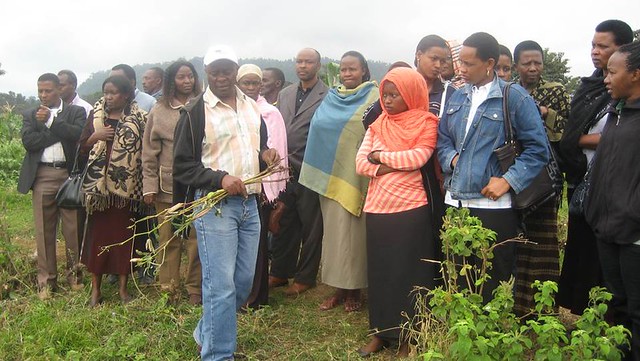RISING voices: Cornel Massawe, nematologist at Tengeru Horticultural and Training Institute, Tanzania
Cornel Massawe, nematologist at Tengeru Horticultural and Training Institute (HORTI Tengeru), introduces himself and his work with the Africa RISING – NAFAKA technology scaling project in Tanzania. It is one of a series of portraits of key people in Africa RISING.

Tell us about your background?
I am Nematologist by training. I hold a PhD degree in plant nematology form University of Zimbabwe. I am Principal Agricultural Research Officer; currently work for banana program as a nematologist in the section of plant protection. Also I am officer in charge of Tengeru Horticultural and Training Institute (HORTI Tengeru), with the national mandate to undertake horticultural research and training activities.. Previously I was working at Ilonga Agricultural Research Institute based in Kilosa district, Morogoro region as a weed scientist, mainly dealing with Striga weed. I joined Ilonga Agricultural Research Institute after completion of my studies at Ukiriguru Agriculture College in Mwanza region.
What do you do in your current position (in context of Africa RISING-NAFAKA project)?
I am involved in the vegetable scaling team. Through the project we have introduced seed kits and established demonstration plots for superior varieties of vegetables in some villages in Babati, Kiteto and Kongwa districts. The vegetable varieties introduced are tomato, African eggplant, amaranth, African nightshade and Jute Mallow (Corchorus olitorius Var. SUD -2). Together with the team we have also been training farmers on good agronomic practices for vegetable farming, vegetable seed reproduction, food safety and post-harvest handling of vegetables.
What are your plans for Africa RISING –NAFAKA project (i.e. your next bit of work)?
We plan to conduct trainings on market access aimed at improving group dynamics and encourage collective action by the small holder farmers we work with on input purchase, basic postharvest technologies/facilities and sale of products. We will also be implementing trainings on market assessment for easier access to market information. Women and un-employed youth are the marginalized groups in most of the agricultural communities, yet are they are the main actors in crop production activities. The group is constrained with inadequate knowledge and skills on many aspects of crop production, pest management and post-harvest management techniques which represent a serious constraint to optimizing yield and market quality of horticulture crops. It is envisaged that this group if imparted with skills in sustainable production, post-harvest practices and marketing will make a significant contribution to food production in the project areas we work in.
What do you find unique about Africa RISING-NAFAKA partnership project?
The synergy that exists between Africa RISING project and the NAFAKA project is quite impressive. While on the one hand Africa RISING is bringing with it outputs such as better crops, better crop management packages, improvement on household nutrition and identified natural resource management strategies; NAFAKA is providing Africa RISING with options and opportunities for learning through action research, and scaling the technologies up and out.
What are the biggest Africa RISING-NAFAKA challenges and how do we deal with them?
Yes we experience some operational challenges within the project. For example, some of the project areas where horticultural activities are the mainstay of food production are prone to flooding during the rainy season. As a project team we advise farmers to establish their plots on uphill areas, but this brings a second challenge of fetching water from the bottom valleys. Problems on group dynamics have also been noted in some of the villages due to poor governance and leadership conflict.
What are some of the main achievements of this program so far?
The project has so far facilitated the introduction of new technologies such as improved crop varieties, and teaching farmers how to apply good agronomic practices (GAP) during nursery management, soil enhancement and pest and disease control. A season- long Training of Trainers for vegetable farmers in nine villages in Manyara and Dodoma regions has been implemented by the World Vegetable Center and HORTI-Tengeru. Several new varieties of crops, including African nightshade, were introduced to participating smallholder farmers.
What do you want to accomplish most in your work with under the Africa RISING-NAFAKA scaling project?
Marginalized groups (un-employed youth, women and men) are the main actors in vegetable production in the project areas. However they are also the most constrained by inadequate knowledge and skills on many aspects of vegetable production, pest management and post-harvest management techniques. This therefore represents a serious constraint to optimizing yield and market quality of vegetables. Through this project, we hope to provide interventions that will enhance the skills of these marginalized groups in sustainable agricultural production.
What gives you hope looking at a possible scaling up in other regions through this project, based on the mother Africa RISING and NAFAKA best bet technologies?
My hope for possible scaling up in other regions is very high due to the following facts: In most areas where the project is currently working, farmers were particularly impressed by new vegetable varieties such as tomato lines bred by AVRDC and introduced under the name ‘Tengeru 2010’. People started to like the big fruits and the slightly salty taste. Farmers have appreciated the nightshade variety ‘Nduruma’. This variety has broader leaves, is very water efficient, and has a sweet taste liked adults and even small children. ‘Nduruma’ and the broad- and narrow-leafed amaranth varieties ‘Madiira I and II’ were well-received during a cooking show and organoleptic tests conducted two weeks earlier in all nine pilot villages. Nightshade variety ‘Nduruma’ introduced by the project team impressed farmers due to the sweet taste, even children under five like to eat this leafy vegetable. In Babati and Kongwa districts, the farmers requested that the project team host another field day during the cropping season to promote the new varieties and practices.





Latest Comments